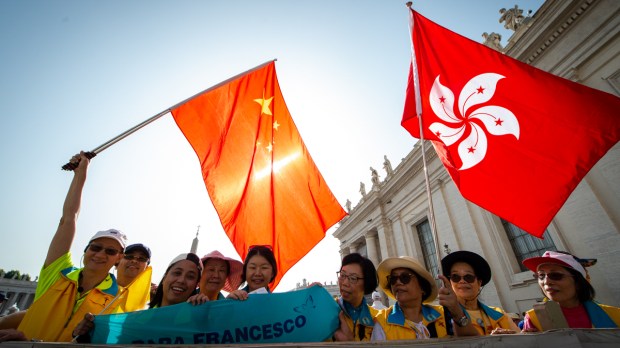Tuesday 14 June 2022
1. Like a flower flourishing through the cracks: Hong Kong’s bishop cultivates hope
2. Exceptional convoy: remains of the Holy Sepulcher travel across Jerusalem
3. In July, 100,000 people will debate the meaning of ‘synodality’ for global Church
4. In Nigeria, Christians must get involved in the elections
5. Church in Ireland struggling to have a conversation with itself
~
Like a flower flourishing through the cracks: Hong Kong’s bishop cultivates hope
In a reflection published in the Sunday Examiner, a weekly Catholic newspaper in Hong Kong, Bishop Stephen Chow evokes the flowers that grow through the cracks in the concrete, as a sign of the “amazing power of life that comes from the Creator.” This is a reality that he believes should inspire Hong Kong and the local Church, which every day is doomed to “an existence within cracks.” “We used to enjoy much space and freedom of expression,” he says, noting the frustrations, anxieties, disappointments, and even exile, chosen by some in the face of the prevailing feeling that Hong Kongers are “living in cracks” without being able to flourish. He asks, however, not to cling to the past, reminding that “accepting the changing context as reality does not mean endorsing it.” He invites the inhabitants of this densely populated megalopolis to allow themselves “the inner space to discern.”
Sunday Examiner, English
Exceptional convoy: remains of the Holy Sepulcher travel across Jerusalem
The remains of 5 columns and 2 capitals of the Holy Sepulcher in Jerusalem are currently being moved from the Garden of Gethsemane to the Monastery of the Flagellation in the Old City, where they will adorn a room in the Terra Sancta Museum. A “titanic” operation, Terre Sainte Magazine points out, since the remains, probably dating from the ancient Roman times, weigh on average 3 tons and are extremely fragile. Why were they in Gethsemane? The article recounts the history of these remains, discovered in 1969 during a major restoration project inside the Anastasis of the Basilica of the Holy Sepulcher. Very damaged, these pieces were evacuated from the church and taken to the hermitage of the sanctuary of Gethsemane. Many studies have been done but the origin and time period of these remains are still uncertain. While their transportation required a long preparatory work, the mystery of their origins remains. For some, “the whole history of Jerusalem, all the suffering of this city and its destruction is contained in these columns.”
Terre Sainte, French
In July, 100,000 people will debate the meaning of ‘synodality’ for global Church
“Common Discernment and Decision Making in the Church” is the name of the ambitious online seminar organized by Boston College’s School of Theology and Ministry in July, which expects to involve up to 100,000 people. With the support of the bishops’ conferences of Latin America, Europe and Asia, the Jesuits of Latin America and the superiors general of male and female congregations, the seminar seeks to help Catholics understand the concept of synodality. Among the speakers is German theologian Judith Gruber, who will speak on “Conflict and Divergence Management.” She will reflect on how the expression of disputes can be “part of the journey towards discerning what the Spirit is saying to the Church.” Congolese nun Josée Ngalula, will address the issue of women’s leadership in the Church and the fight against abuse, and Singaporean theologian Christina Kheng will discuss the Asian vision of discernment, including the question of moving from “I” to “we” and co-responsibility.
Crux, English
In Nigeria, Christians must get involved in the elections
With just under a year to go before Nigeria’s general elections, Bishop Bulus Yohanna of Kontagora has called for the country’s faithful to get involved in the democratic process, either by preparing to vote, running for office, or joining a political party. As President Muhammadu Buhari leaves office after two four-year terms, the Bishop sees an opportunity for Christians to play an important role. “It is necessary to vote into power those who can fix our roads, build hospitals, ensure our children get a better education, provide security, all the basic amenities and then secure the future of the country,” he explains, urging everyone to pick up their voter’s cards.
Gazettengr, English
Church in Ireland struggling to have a conversation with itself
Next Saturday, more than 100 people, laity, religious, priests and bishops, will participate in the daylong national assembly of the Church in Ireland. This event will be the result of the “unprecedented national consultation” as part of the synod on synodality, which will then culminate in Rome in 2023. “People have been delighted to be asked their views, there is a sense of hope and energy, and many are calling for a continuation of this synodal way of proceeding,” explains Irish theologian Gerry O’Hanlon in an opinion article. However, he also explains that to many this process seems almost “too good to be true.” This is because the Church in Ireland is still healing from the “open wound of abuse, clerical and institutional, and its poor handling by leaders,” which has “inevitably hung over the” synodal process. Despite various efforts, “a reckoning still needs to be had,” the author explains. Additionally an “overwhelming majority want equality for women in the church […] and an inclusive approach to the LGBTQI+ community,” the author says, emphasizing that this is part of “a deeper sense of a gap between faith and life, and between the institutional church and the ambient culture.” O’Hanlon also acknowledges that there is a minority that disagrees with these proposals and prefers an adherence to more traditional ways. “This reminds us of the need to discern carefully the difference between simply following the prevailing culture in a superficial way, out of an almost desperate desire to be accepted, and being humble enough to realize that we get things wrong and (as Vatican II taught) we can learn from the world and culture about us,” the author reflects.
Irish Times, English

